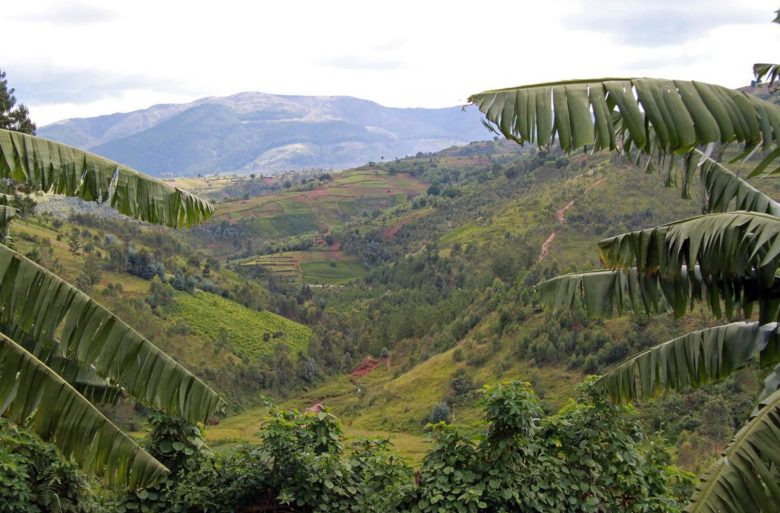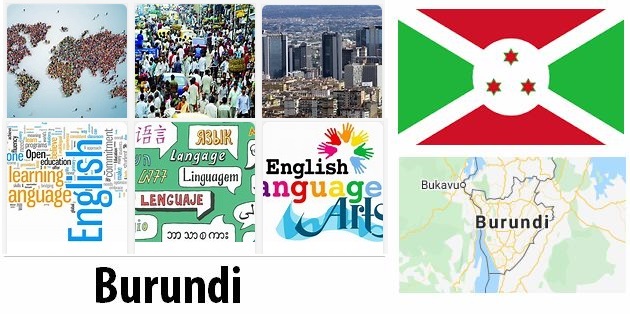Burundi
Burundi, a small republic in Central Africa, inland just south of the equator. The land has no coastline but is bounded by several rivers and Lake Tanganyika in the south. Burundi borders Rwanda in the north, Tanzania in the east and south, and the Democratic Republic of Congo (formerly Zaire) in the west. The capital is from December 2018 Gitega (formerly Bujumbura).
Until World War I, Burundi was a German colony, then part of the Belgian mandate of Rwanda-Urundi until it became an independent kingdom in 1962, a republic from 1966.
The history of Burundi is linked to the history of neighboring Rwanda in the north. Like Rwanda, in modern times Burundi has experienced a great deal of turmoil between the two largest groups of hutu and Tutsi with civil war and massacres. Society and politics in the country are strongly influenced by this, the unrest has also had financial consequences.
Burundi is known for its coffee exports.
Burundi’s national anthem is Burŭndi bwâcu (‘Dear Burundi’).
Geography and environment
Burundi is situated on the African high plateau and is part of the Rift Valley. In the south, Burundi borders on Africa’s longest and deepest lake, Lake Tanganyika. Like neighboring Rwanda, Burundi is made up of hills and mountains, with a flatter section down towards Tanganyika Lake and the Ruzizi River, which is a border river against the Democratic Republic of Congo.
The highest mountain in Burundi is Mount Heha, which has a peak of 2684 meters above sea level. The country has several national parks, which in peaceful times bring tourists to the country. Because much of the land is at altitude, the climate is temperate but more tropical down towards Ruzizi and Tanganyika.
Burundi has a short and a long dry season, and a long and a short rainy season. The first short dry period occurs at the turn of the year, from December to January, followed by a long rainy season from February to May. This is interrupted by a longer dry period in June to August, before the short rainy season in September to November.
People and society
The two largest groups of people in Burundi are Hutu and Tutsi. These make up 85 per cent and 14 per cent of the population respectively. Hutu and Tutsi are often called two different “ethnic groups”, but speak the same language and share the same culture. Traditionally, the difference between the groups has been in real estate. The Hutu traditionally cultivated the land, while Tutsi were cattle drivers.
Around one percent of the population is twa, formerly known as pygmies. These were traditionally a hunter and sanker and are found throughout much of Central Africa. Both Hutu and Tutsi speak Kirundi, which is the official language next to French.
86 percent of the population are Christians, the majority of whom are Catholics (over 60 percent). Protestant and evangelical groups have grown in recent years.
After years of turmoil, part of the population has fled the country. Tanzania houses the largest Burundian population outside Burundi, the number is estimated at 200,000. In addition, over 80,000 have fled to Rwanda, and there are Burundian refugees in the Democratic Republic of Congo and Uganda.
State and politics
Burundi is a republic today. After many years of civil war, the country was granted a new constitution in 2005, which was approved through a referendum. The new constitution outlines a division of power between Hutu- and Tutsid-dominated groups, and since 2005 an attempt has been made to stabilize the country.
Next to the president is the supreme power of parliament. This consists of a Senate, with representatives from each of Burundi’s 18 provinces, and a National Assembly.
Pierre Nkurunziza, a hutu, was elected president in 2005. He was also re-elected president in 2015 despite major protests and accusations of increasingly authoritarian rule.
History
Burundi has long been a densely populated area of Africa, with fertile hills and access to good fishing in the Great Lakes. Originally, this part of Africa was populated by hunters and sankers, before agriculture settled in the Middle Ages.
The kingdom of Burundi, or Urundi, was formed in the 1600s, based on the ruling and cattle-driving group of Tutsis. The Tutsis constituted the royal family and the nobility, a king in Urundi had the title of mwami. A similar kingdom was formed just north of Burundi in Rwanda.
In the 1850s, Europeans first visited these kingdoms. The kingdoms of Urundi and Rwanda became part of German East Africa in 1890, but were conquered by the Belgians during the First World War. After the war, in 1923, the area was officially subjugated to Belgium through a resolution in the League of Nations, the forerunner of the United Nations (UN). Both Rwanda and Urundi were ruled by a Tutsi elite.
When Urundi gained independence in 1962, under the name of Burundi, the new state was established as a constitutional monarchy. King Mvambutsa 4 was Tutsi, but positions in the state by the way were carefully divided between the two largest groups of people. However, many Hutus chose to flee to Rwanda, where this group had gained more power after independence.
The relationship was tense between the groups, as in Rwanda at the same time. When the prime minister, this post belonging to a hutu, was killed in 1965, this triggered a coup attempt by the hutu against the king. He responded by deploying his forces against both Hutu politicians and intellectuals, and most Hutu. In the turmoil that followed, the kingdom was liquidated.
In the years that followed, the old Tutsi nobility consolidated power, and at the same time the Hutu secured their positions in neighboring Rwanda. Both countries experienced massacres. In Burundi’s case, the hutu mass murder culminated in 1972. Up to 200,000 may have been killed, even more fleeing to neighboring Rwanda and Tanzania. The turmoil continued and triggered new massacres, both on Hutu and Tutsi until 1993. This year, FRODEBU, a Hutu-dominated party, won the election. Outlying groups of both Tutsi and Hutu used the opportunity to massacre opponents. In the ensuing war, up to 300,000 people lost their lives.
The violence in Burundi prompted Burundi President Cyprien Ntariyamira, and Rwanda President Juvénal Habyarimana was in Tanzania in April 1994 for talks. When the two presidents returned to Rwanda’s capital Kigali on April 7, 1994, the aircraft they were put into was shot down. This was the start of the genocide in Rwanda. Although both countries had experienced massacres, the Rwanda genocide was something else entirely, about a million Tutsi, and moderate Hutu, were killed within a hundred days.
The Rwanda genocide also led to increased tensions in Burundi, including massacres on Hutus. Refugees from Rwanda contributed to an increasingly bleak picture of rebel groups both in Burundi and the Democratic Republic of Congo. In 1996 Pierre Buyoya performed a coup. The war continued in Burundi until 2005, when there finally was a consensus between Tutsi and Hutu-dominated groups on power sharing. By then, the 12-year civil war had cost 200,000 lives.
After the war, former Hutu rebel Pierre Nkurunziza was elected president. In 2008, a peace agreement was signed with the last of several rebel groups in Burundi.
The balance of power between groups in Burundi was upset when President Nkurunziza ran for election for a third term, and won, in 2015. To carry out the election, security forces were engaged, and opposition and human rights activists, lawyers and student activists were beaten. Since the unrest after the election, there has been fear of new civil war and new massacres in Burundi.
Economy and business
Burundi is still an agricultural country, seven out of ten Burundians working on food production. Most of the food is produced to feed their own population. Burundi’s main export commodity is coffee, which accounts for half of the country’s export revenue and is shipped by boat from the capital Bujumbura. Tea and cotton are also grown for export.
Both unrest and the country’s location have contributed to the emergence of little other industry in the country. Burundi has for many years received development assistance to raise the budget. Following new turmoil in 2015, several donors have withheld this assistance. This has hit the economy in the country hard.
The country is expected to be able to rely on some mineral resources. Among other things, oil, nickel and copper are being searched, which are raw materials in several countries in the region.
Knowledge and culture
Many with higher education were killed during the massacres in 1972. The ensuing years of turmoil have hit the education system hard, and very many in Burundi can neither read nor write. There is a university in Bujumbura, and the capital has a small group of museums.
In the ancient kingdom of Urundi, groups of drummers had a ceremonial function, including the inauguration of a mwami, a king. The Royal Drummers of Burundi, based in the United States, has recently made several recordings and performed worldwide.
In recent years, the poet Ketty Nivyabandi has received increased attention, and her poems have been translated from French into several languages. In 2015, she had to flee the country after taking part in the protests against President Nkurunziza.



